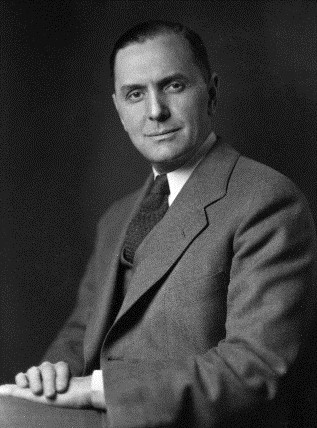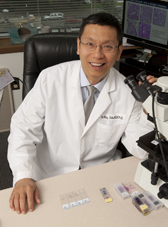 RICHARD W. TELINDE, MD, the third Professor of Gynecology at Johns Hopkins, was born in 1894 in Waupun, Wisconsin. He attended Hope College and the University of Wisconsin, receiving his AB from the latter in 1917. He started medical school at the University of Wisconsin and transferred to the Johns Hopkins University School of Medicine, where he was elected into Alpha Omega Alpha and received his medical degree in 1920. Dr. TeLinde was an intern in surgery under William Halsted and a resident in gynecology under Thomas Cullen. In 1925, he began a private practice in Baltimore which he maintained until 1972. In 1939, Dr. TeLinde was appointed Chair of the Department of Gynecology, a significant event because Gynecology became a separate department from Surgery. Upon Dr. TeLinde’s retirement as Chair in 1960, Gynecology and Obstetrics became a joint department.
RICHARD W. TELINDE, MD, the third Professor of Gynecology at Johns Hopkins, was born in 1894 in Waupun, Wisconsin. He attended Hope College and the University of Wisconsin, receiving his AB from the latter in 1917. He started medical school at the University of Wisconsin and transferred to the Johns Hopkins University School of Medicine, where he was elected into Alpha Omega Alpha and received his medical degree in 1920. Dr. TeLinde was an intern in surgery under William Halsted and a resident in gynecology under Thomas Cullen. In 1925, he began a private practice in Baltimore which he maintained until 1972. In 1939, Dr. TeLinde was appointed Chair of the Department of Gynecology, a significant event because Gynecology became a separate department from Surgery. Upon Dr. TeLinde’s retirement as Chair in 1960, Gynecology and Obstetrics became a joint department.
During his tenure, Dr. TeLinde set the tone and created a standard of excellence for an academic department in the specialty of gynecology. He was a superior surgeon and outstanding investigator and teacher. An important part of his legacy was the perpetuation of excellence in gynecology through the training of residents. Eight of his residents became department chairmen at academic institutions and three others became directors of gynecology at large community hospitals. Because Dr. TeLinde believed that an understanding of pathology was essential for the training of a gynecologist, he endowed through his personal philanthropy a Chair in Gynecologic Pathology in the Johns Hopkins Department of Gynecology and Obstetrics.
Dr. TeLinde’s research interests were in the areas of reproductive endocrinology, oncology, urinary incontinence, and endometriosis. In 1944, he and his colleagues, Gerald Galvin, MD and Howard Jones, Jr, MD, launched a series of studies spanning 22 years that ultimately provided convincing evidence that invasive cervical cancer was preceded by a noninvasive precursor—carcinoma in situ. Dr. TeLinde strongly advocated and was one of the pioneers of the approach of combining Pap smears and cervical biopsies for the prevention of cervical cancer.
Dr. TeLinde published over 100 research articles making major contributions to the study of granulosa cell tumors of the ovary. His text on surgery, Operative Gynecology, first published in 1946 and still in print today, is often referred to as “the bible” of gynecology, and has been the premier text in the field of gynecologic surgery for more than 60 years. Dr. TeLinde was highly regarded by colleagues nationwide and was a president of the American Gynecological Society. He performed surgery until he was 72 years old and continued with his private practice for 12 more years. He died in 1989 in Baltimore at the age of 95.
Held by Ie-Ming Shih
 IE-MING SHIH, MD, PhD, is a Professor of Gynecology/Obstetrics, Pathology and Oncology. He is a board-certified attending pathologist in the Division of Gynecologic Pathology and co-director of the emerging Female Reproductive Cancer Program at the Kimmel Cancer Center.
IE-MING SHIH, MD, PhD, is a Professor of Gynecology/Obstetrics, Pathology and Oncology. He is a board-certified attending pathologist in the Division of Gynecologic Pathology and co-director of the emerging Female Reproductive Cancer Program at the Kimmel Cancer Center.
Dr. Shih obtained his medical degree from the Taipei Medical University, Taiwan in 1988, and received his post-doctorate degree in biomedical studies at the University of Pennsylvania in 1993. He completed residency training in Anatomic Pathology followed by a gynecologic pathology fellowship at the Johns Hopkins. He spent two post-doctoral years in the laboratory of Bert Vogelstein, MD studying molecular cancer genetics. He was appointed to the faculty of Johns Hopkins in 2000 as an instructor and was promoted to full professor in 2008.
Dr. Shih’s research focus is on the molecular pathogenesis of gynecologic diseases, especially in the fields of gynecologic oncology and gestational trophoblastic diseases. More specifically, his ovarian cancer research team has applied genome-wide analysis, and molecular and cellular biologic techniques along with various animal models to elucidate the molecular etiology and pathogenesis of chemoresistance in ovarian and, most recently, uterine cancer. His work has had a particular emphasis on translational implications, including strategies for ovarian cancer prevention and identification of targetable pathways for new therapeutics. In addition to his gynecologic oncology studies, Dr. Shih is an enthusiastic investigator in human trophoblast pathobiology. He has identified biomarkers to define various types of gestational trophoblastic tumors and tumor-like lesions. Dr. Shih has also led a number of clinicopathological studies in characterizing a variety of gynecologic diseases, and has established the focused Ovarian Cancer Research Tumor Bank at the Johns Hopkins, which employs an integrative banking strategy and well-annotated clinical information to support the research of many laboratories as well as his own team.
Dr. Shih has published extensively in the fields of gynecologic pathology and cancer research with more than 300 original publications and book chapters. He sits on many advisory boards nationally and internationally. He is the Editor-in-Chief of Current Reports of Obstetrics and Gynecology and serves as an editorial board member in Cancer Research, Journal of Pathology and several others. Dr. Shih is an active educator of graduate, undergraduate, and medical students, and has served as a mentor for more than 40 trainees in the past decade. Many of them have received research awards and have become faculty members in academic institutions worldwide. Besides his obligations in clinical service, research, and teaching, he is also a passionate photographer.
 RICHARD W. TELINDE, MD, the third Professor of Gynecology at Johns Hopkins, was born in 1894 in Waupun, Wisconsin. He attended Hope College and the University of Wisconsin, receiving his AB from the latter in 1917. He started medical school at the University of Wisconsin and transferred to the Johns Hopkins University School of Medicine, where he was elected into Alpha Omega Alpha and received his medical degree in 1920. Dr. TeLinde was an intern in surgery under William Halsted and a resident in gynecology under Thomas Cullen. In 1925, he began a private practice in Baltimore which he maintained until 1972. In 1939, Dr. TeLinde was appointed Chair of the Department of Gynecology, a significant event because Gynecology became a separate department from Surgery. Upon Dr. TeLinde’s retirement as Chair in 1960, Gynecology and Obstetrics became a joint department.
RICHARD W. TELINDE, MD, the third Professor of Gynecology at Johns Hopkins, was born in 1894 in Waupun, Wisconsin. He attended Hope College and the University of Wisconsin, receiving his AB from the latter in 1917. He started medical school at the University of Wisconsin and transferred to the Johns Hopkins University School of Medicine, where he was elected into Alpha Omega Alpha and received his medical degree in 1920. Dr. TeLinde was an intern in surgery under William Halsted and a resident in gynecology under Thomas Cullen. In 1925, he began a private practice in Baltimore which he maintained until 1972. In 1939, Dr. TeLinde was appointed Chair of the Department of Gynecology, a significant event because Gynecology became a separate department from Surgery. Upon Dr. TeLinde’s retirement as Chair in 1960, Gynecology and Obstetrics became a joint department.